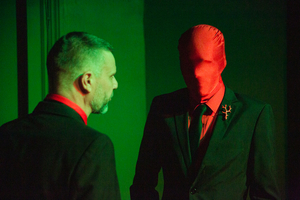Review: THE CORAL, Finborough Theatre
Emily Louizou's revival often feels more like an art installation than a play

![]() The Coral is the first part of Georg Kaiser's expressionist trilogy Gas, which follows the story of three generations of one family. Imaginatively staged, for the first time in the UK for 100 years, Emily Louizou's revival captures in looks and sounds, but fails to engage the audience with its message.
The Coral is the first part of Georg Kaiser's expressionist trilogy Gas, which follows the story of three generations of one family. Imaginatively staged, for the first time in the UK for 100 years, Emily Louizou's revival captures in looks and sounds, but fails to engage the audience with its message.
The Millionaire has a profound fear of poverty and so focuses all his efforts on wealth accumulation. He also wants to create a happy and secure childhood for his own children that he never had. But financial security does not guarantee happiness. As the Millionaire exploits the poor through his efforts to secure his wealth, his socially-aware children reject him and The Millionaire turns to ever-more desperate means to escape both his past and present.
Stuart Laing is unblinking and monotone as The Millionaire, given to convincing flashes of anger. The rest of the cast multi-roll; Adam Wooley is nervous as The Secretary and louche as the Museum Curator, Joanne Marie Mason is forthright as Older Daughter, Esme Scarborough brings an aloof quality to Younger Daughter and a rather hackneyed Cockney accent to the role of dectective. Arielle Zilka is calm and measured as The Assistant, but brings some much-needed lightness to the small role of Friend.
What is notable is how little professional experience most of the cast has; they do an admirable job with an often turgid script. For the audience, expressionist theatre is a challenging genre to watch. Louizou draws heavily on the expressionism style, with the dreamlike sequences in vivid, unnatural colours. The dialogue is often disjointed and abstract.
Special mention must go to the lighting and sound design; David Denyer's imaginative composition features echoing static, whispering and distorted, haunting music, which carries much of the production. Amy Hill's lighting creates nightmarish images, especially with the use of shadow and blackouts. The production often feels more like an art installation than a play, which undermines what is trying to be the central message.
Kaiser wrote this play just after the end of the Great War, as the world had changed forever. He challenges the influence of capitalism and the power that money holds over society and individuals within that society. It's a shame that the message is blurred through the style of the writing. Overall the play needs more pace and clarity. The second half of the production feels laboured and more stilted than it needs to be. Is it a surreal nightmare? Who is possessing whom? Even when capitalism is challenged, there is no resolution and we leave with more questions than answers.
It's a shame that Louizou has chosen such a tough play for her company, Collide, to put on. There's a reason why it has been so long since this play was revived, but what the production does show is the potential and promise of an exciting young theatre company.
The Coral is at the Finborough Theatre until 29 October
Photo Credit: Marshall Stay
Reader Reviews
Videos

